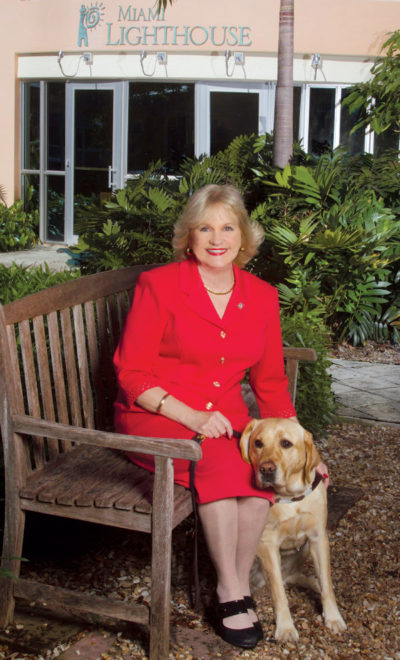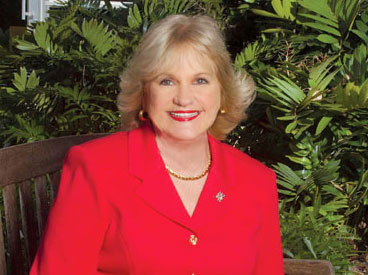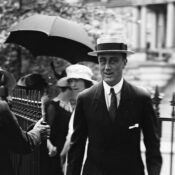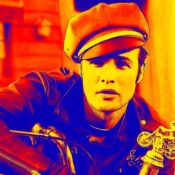
Virginia Jacko was going blind. She knew it, but not everyone else did. Since the mid-1990s, her vision had been steadily deteriorating. Though capable of seeing people and objects in front of her, she might not recognize a person standing at her side. Finally, in 1998, then in her 50s, Virginia was diagnosed with retinitis pigmentosa, an irreversible disease affecting about 1 in 4,000 people in the United States. The disease attacks the cells controlling night vision and peripheral vision first. But in advanced cases, such as Virginia’s, it robs central vision, eventually leading to blindness.
So it was with trepidation that Virginia arrived at the office of the incoming president of Purdue University for an initial meeting with her new boss. She wanted to assure the president that she could still fulfill her responsibilities as the financial advisor to the president and provost.
For years now, she’d found ways to adapt her personal and professional life to an increasingly narrow visual world. She scouted out meeting sites ahead of time. She’d stopped driving, relying on taxicabs if she needed to get somewhere quickly. She prepared for meetings at night, her face close to the monitor so she could read words on the screen and memorize data on Excel spreadsheets. “I never got depressed or felt sorry for myself,” says Virginia. “Negative energy is just a waste of time.”
But that fateful morning in late 2000, as she reached the office of the president’s assistant, her heart sunk. The president had ordered new furniture that completely changed the layout of the room. Virginia realized she would not be able to navigate the space without help. So, thinking fast, she pretended to be running late for the meeting and waited for the president to step away from his office. When he did, she slipped in, guided by the assistant, and sat down on the couch. When he returned, she merely had to stand up to greet him.
The plan was a success, but the experience was a loud wake-up call that Virginia couldn’t ignore. She needed to learn to live as a blind person if she was going to succeed in a sighted person’s world. Her vision was getting to be too much of a problem to conceal. After the meeting, she called her husband Bob, a professor of civil engineering at the same university. She told him she needed to take a three-month medical leave. She would study at a vision rehabilitation facility.
One of her three children, Julie, urged her to check out the Miami Lighthouse for the Blind and Visually Impaired. Virginia and Bob owned a condominium in Miami, so she would have a place to stay. Once there, Virginia immersed herself in the world of the blind, honing skills she once took for granted, such as baking oatmeal cookies and sewing buttons on clothes. She soaked up everything she could learn about computer programs for the blind, including programs that convert text to speech. After the three-month program, Virginia felt a renewed sense of confidence. “I learned that a blind person can do anything a sighted person does. They just have to learn to do things differently,” she says.
At the end of her medical leave, Virginia was at a crossroads. She could return to her job at Purdue and continue to advise the president and provost on financial affairs. Or she could continue her efforts to regain her mobility by enrolling in a one-month, 24/7 intensive training program with a guide dog. She chose the latter.
By then, not only was Virginia completely blind but for the first time in her life, she was stepping into the future without a clear career path. Yet she was at peace with her decision. “I had changed. Walking out the doors of Miami Lighthouse as a graduate of the program, I realized that my passion was helping the blind,” she says.
Virginia’s husband Bob spent three months with her in Miami while she completed the program but, as a tenured professor, he had to return to Purdue for the new school year. Virginia would stay in Miami with her new guide dog Tracker, immersing herself in work at the Miami Lighthouse. She began as a volunteer, but such was her financial experience—and drive—that she soon became treasurer and a member of the board.
Not everything went smoothly for Virginia as she adapted to her new life. Once, while out on a stroll along a coastal walkway, Tracker stepped aside to avoid colliding with a woman pushing a stroller. The sudden move knocked Virginia off the breaker wall and she plummeted into the sea. Virginia calmly treaded water until someone lowered a ladder, allowing her to climb back up to solid ground.
Another time, she attempted to sit down for lunch at a restaurant in a major department store, only to be told she couldn’t bring Tracker into the restaurant. Not one to be easily thwarted, she stood her ground and seated herself with her guide dog at a table. That day, she called the company’s headquarters and advised that the incident would result in a public relations fiasco unless changes were made. In no time, the chain changed its policy, and it now provides Americans with Disabilities Act (ADA) compliance training for all employees.
In early 2005, the president and CEO of Miami Lighthouse left unexpectedly for personal reasons. The chairman asked Virginia to serve as president and CEO on an interim basis until a permanent replacement could be found. Following a nationwide search, the board selected Virginia, making her the first blind president and CEO in Miami Lighthouse’s 81-year history.
Virginia wasted no time in growing the organization by offering innovative programming as she deepened relationships within the philanthropic community. “When I took over in 2005, we had one grant and today we have more than 30 active grant awards,” she says.
Thanks to her outreach efforts, revenue has nearly tripled, allowing the organization to vastly increase the scope of its services. Today, Miami Lighthouse teaches rehabilitation skills to people of all ages—from blind babies to seniors with low vision—allowing them greater mobility and self-reliance. Miami Lighthouse has become a center of excellence in vision rehabilitation because of its innovative programs, such as sound engineering and mobile eye care for low-income schoolchildren. All told, under Virginia’s leadership, the organization has increased the number of people it serves fourteen-fold to about 10,000 annually.
All of this on a budget that Virginia watches like a hawk. For five consecutive years, Miami Lighthouse has received the highest rating from Charity Navigator, America’s largest independent charity evaluator of financial health and accountability.
Virginia’s disability has never slowed her down. “Virginia is such a determined person. Having a deep faith; supportive family; and positive, can-do attitude are at the core of her success,” says Doug Eadie, co-author of Virginia’s autobiography, The Blind Visionary.
“I am so blessed,” Virginia says today. Her blindness, she feels, was a gift that allowed her to find a new mission and purpose in life. “We transform people’s lives at Miami Lighthouse every day. I lost my vision, and I found my passion.”
Become a Saturday Evening Post member and enjoy unlimited access. Subscribe now




Comments
How inspiring! In the darkness, stars shine brightest! Virgina Jacko is a star, no doubt about that.
What a wonderful woman, an inspiration to so many people, both sighted and blind! It just goes to show: one person’s handicap is another person’s opportunity – it’s all in how you react to the situation, what you do with it, how you use it to better not only your own life, but the lives of others. “I never got depressed or felt sorry for myself,” says Virginia. “Negative energy is just a waste of time.” Mrs. Jacko, truer words were never spoken, and they are words we ALL need to memorize, then put into positive action, the way you have! Bravo, dear lady, bravo!
What an inspiring story, an example for anyone with a disability